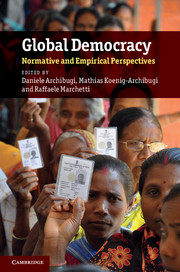Book contents
- Frontmatter
- Contents
- Figures
- Tables
- Notes on contributors
- Acknowledgements
- 1 Introduction
- 2 Models of global democracy
- 3 Citizens or stakeholders?
- 4 Is democratic legitimacy possible for international institutions?
- 5 Cosmopolitan democracy
- 6 Regional versus global democracy
- 7 Towards the metamorphosis of the United Nations
- 8 Flexible government for a globalized world
- 9 Global democracy and domestic analogies
- 10 Global democracy for a partially joined-up world
- 11 Civil society and global democracy
- 12 Global capitalism and global democracy
- 13 From peace between democracies to global democracy
- 14 The promise and perils of global democracy
- Index
- References
3 - Citizens or stakeholders?
Exclusion, equality and legitimacy in global stakeholder democracy
Published online by Cambridge University Press: 05 June 2012
- Frontmatter
- Contents
- Figures
- Tables
- Notes on contributors
- Acknowledgements
- 1 Introduction
- 2 Models of global democracy
- 3 Citizens or stakeholders?
- 4 Is democratic legitimacy possible for international institutions?
- 5 Cosmopolitan democracy
- 6 Regional versus global democracy
- 7 Towards the metamorphosis of the United Nations
- 8 Flexible government for a globalized world
- 9 Global democracy and domestic analogies
- 10 Global democracy for a partially joined-up world
- 11 Civil society and global democracy
- 12 Global capitalism and global democracy
- 13 From peace between democracies to global democracy
- 14 The promise and perils of global democracy
- Index
- References
Summary
Introduction
At the heart of the democratic project is the simple idea that individuals should have a say in all political decisions that significantly affect their lives. This idea is sometimes called the ‘all-affected’ principle (Goodin 2007, Koenig-Archibugi forthcoming) and is at other times associated with the concept of ‘stakeholding’. In a recent book, I have developed in some depth a model of ‘global stakeholder democracy’, based on a liberal interpretation of such a principle (T. Macdonald 2008). My proposal is that in the era of globalization we should approach the task of democratization – at least in part – by making powerful global actors such as states, international organizations, non-governmental organizations (NGOs) and corporations directly democratically accountable to the individuals whose autonomy is prospectively constrained by their decisions. In other words, one of the things that democrats should try to do is place global institutions more firmly within the political control of their ‘stakeholders’.
This approach to democratizing global politics faces many challenges at both practical and theoretical levels; in this chapter I focus on just one of these challenges. Specifically, I address the charge that placing the stakeholder principle at the heart of the democratic project has the effect of jettisoning another fundamental democratic value – political equality. This charge can be formulated roughly as follows. Stakeholder democracy allocates roles in collective decision making to individuals based on their political affectedness (by a particular decision or set of decisions), rather than their political membership – which in the global case entails membership within an overarching ‘global society’ with a shared global institutional scheme and associated political identities. On the stakeholder model, therefore, the demos defined as the group empowered to participate in any given political decision-making process will not necessarily or always be equivalent to the demos defined differently as the population sharing a common scheme of political institutions, and political identities associated with these. As a result, stakeholder democracy appears to some commentators to permit the exclusion of certain individuals and groups within global society – those who turn out not to be ‘affected’ in the relevant way by particular political decisions – from equal access to some important decision-making processes.
- Type
- Chapter
- Information
- Global DemocracyNormative and Empirical Perspectives, pp. 47 - 68Publisher: Cambridge University PressPrint publication year: 2011
References
- 4
- Cited by



